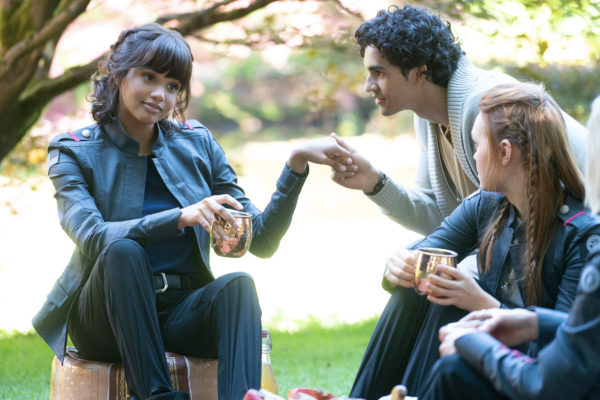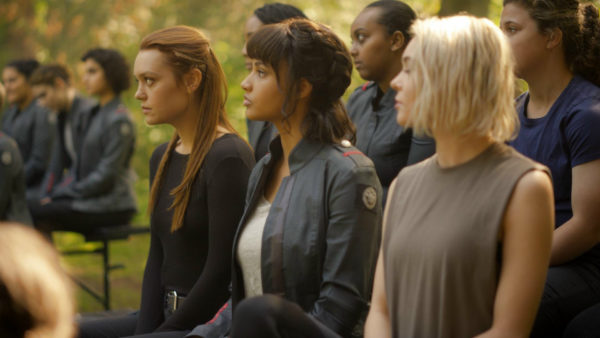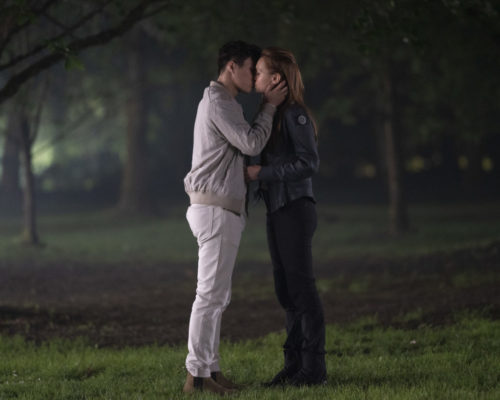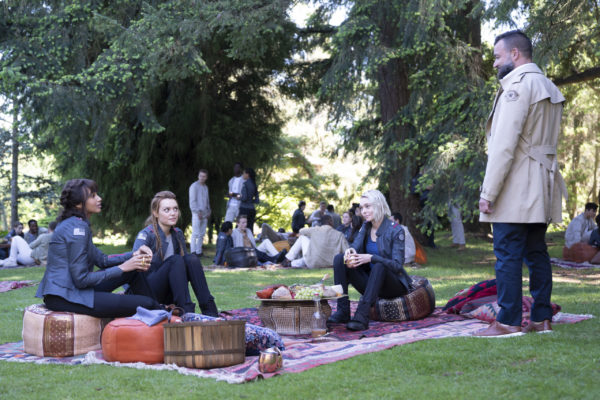
Each week, Joe (@bstolemyremote) and Terry (@gaylydreadful) review an episode of Freeform’s Motherland: Fort Salem, alternating between our respective sites — queerhorrormovies.com and gaylydreadful.com.
Spoilers follow for episode three…
1.03 “A Biddy’s Life”: Male witches arrive at Fort Sale for Beltane. Raelle learns more about Scylla’s past. The international military council of witches must deal with a new crisis.
JOE
Well Terry, here we are in week three of Motherland: Fort Salem and I feel like some of our big concerns raised in previous reviews have begun to be addressed. We still don’t know a great deal about the broader world, and yet the little tidbits that we are learning have really helped to flesh out this world. In addition to another Spree attack this week, we learn that there are boy witches, that there’s a world council (where Lyne Renee’s General Adler has even more enemies) and we get clarification of just who the Biddies are and what their purpose is.
Let’s start there, if only because the reveal is both incredibly simplistic, yet surprisingly effective. “A Biddy’s Life” is divided between two distinct storylines: our young cast flirting and mingling with boys during the ritual of Beltane, and Adler’s trip to the Hague to spar with General Sharma (Chelsea Gill). The latter is the less interesting of the two, if only because we have no idea who any of these other Generals are and the only real insight we learn is that there is a lost tribe of witches caught between the armies of Russia (present at the meeting) and China (unaccounted for). Adler doesn’t want to do anything rash, like start a war between the two countries, despite a lot of salivating by the other members of the Council when they learn that this tribe has powerful Seeds (eggs that play hymns) that could be useful in the war against the Spree.
Umm…sure.

Then, mid-way through negotiations, one of Adler’s Biddies slumps over, prompting the same reaction in Adler, as well as a noticeable – and immediate – decrease in her youth and vitality. At the same time, all of the fruits and plants at Fort Salem wilt and rot. Later we see Devon (Silvana Estifanos), a young recruit, take her place within the Biddy circle as the old one’s candle is literally snuffed out. When Devon joins, Adler becomes young as Devon immediately ages. So in a nutshell: Adler is a parasite who feeds on the youth of a Biddy to stay fresh and powerful, and Adler’s health either maintains or is directly tied to the environment at Fort Salem. It’s kind of a fascinating and unexpected reveal. Does it change anything about the series? In truth, not really, but once again it offers a glimmer of world building and how these peoples differ from ours.
Meanwhile, in the A plot, we follow each of our trio as they negotiate a day of courtship and flirting with the Witchfather (Nick Tarabay)’s boys…well, except Raelle (Taylor Hickson) who tries to crack girlfriend Scylla (Amalia Holm)’s history.
As always, the storyline that I enjoyed most belongs to Tally (Jessica Sutton), who must overcome her nerves and inexperience when she falls for a supercute boy named Gerit Buttonwood (Kai Bradbury). It’s all very sweet, particularly when he eventually reassures her that her decision to enlist, despite being the last of the Craven family line, was the right decision. <swoon>
Terry, I’ll turn it over to you to walk us through your feelings on the other two girls. Did the ongoing feud between Abigail (Ashley Nicole Williams) and Libba Swythe (Sarah Yarkin) offer anything new? What about the appearance of Scylla’s ex, Porter (David Lennon) who *gasp* winds up dead by suicide at episode’s end? And as cool as the image of the pool freezing over is, do these Spree attacks really contribute anything to the series?

TERRY
I want to linger on Gerit Buttonwood for a moment, Joe. Because the names in this show are killing me. First it was the introduction of Lieutenant Sergeant and Junior Matrimonialist Berryessa Tansey (Jill Morrison), whose name, when said at once, sounds like Berries Satansey. It amused me enough to make a note of it.
But back to Gerit. My first thought was, “aww, cute as a button” which is true of Gerit, particularly as he flirts with Tally in the most adorable and, to echo you, yes, most interesting part of the show. And then when you look up Buttonwood, which is a type of tree, Wikipedia gives us this little nugget of information: “it burns very hot and slowly.” Another definition I could come up with would be, “smoulders”. Because Gerit is smouldering.
I also enjoyed that we get an inverse of the typical war movie trope of a bunch of women visiting the menfolk, purely as ornamental sexual objects. Here, we have a throng of boys, shedding shirts to play lacrosse (I think? My only interaction with that sport was through Teen Wolf) and, by the end of the episode, Tally mentions their job is to be charming and wonderful. The implication here is that they are the pretty things meant to relieve stress for the women and build bonds “however they see fit.” It’s very sexually liberating and I think it’s amazing to see these female characters being treated as sexual beings the way men are in war movies.
I could have followed Tally and Gerit around on their flirtatious rounds the entire episode because, again, we’re saddled with uninterestingly staged fake drama centered around Libba and Abigail. I hated this demonstration of their ancestor’s role. The taking-turns way they strut to and from the stage? It’s so manufactured, trite and boring. The only thing it adds to the story is something explored pretty subtly throughout “A Biddy’s Life”: how important ancestry is in this world.
First, there’s witches giving up their lives and essence for Adler, a woman who’s lived centuries and who helped establish the Salem Accord. There’s the Bellweathers and the ancestor who sacrificed herself–and her entire army, let’s be clear–to hold off their enemies while the Swythe ancestor called upon storms to ultimately defeat whoever they were attacking. It’s about mythmaking and the stories we create about the “heroes” who came before. The families that make a name for themselves, while the nameless and faceless people who help them are forgotten by society. Much like, I would hazard to guess, the way that the Biddies are forgotten outside of the witches who knew and revered them. Instead, it’s all to continue the famous Adler’s reign.
Circling around to the Spree: my only thought about showing the pool freezing is to offer up some action in the midst of lots of talking. We complained last episode about the lack of anything exciting going on and I feel like this is the show’s attempt at injecting something other than walking-and-talking. I dunno, I guess it’s interesting to see that the Spree’s attacks include more than making people suicidal? And, honestly, I’d probably complain if all we got was a scene of the trainees crying and talking about the freezing rather than seeing it. It’d be like Game of Thrones season 1: “There was this battle here. Try to imagine what happened.”
Finally, Porter? Meh. Unless Raelle’s magic spell (“knock and it shall be opened to you”) somehow managed to transfer some knowledge from Porter to her, what’s the point? Am I being too harsh on that, Joe? Are you at all intrigued with the way the witches’ United Nations-esqe meeting seems similar to the way America is positioned in the real world? And are they racing towards a war over these desert witches?

JOE
Oh gosh, I hope not. I can’t think of anything less interesting than some kind of arms race over a random tribe of desert witches. Just writing that sentence sent me into a coma.
I can’t honestly say that I’m enthused by the broader world implications just yet. In part it’s because all that we’ve seen are these snippets behind closed doors with the President and these Generals, so it doesn’t carry a great deal of heft. My new complaint is basically that I’m not invested in either the fight against the Spree or the conflict between nations. Motherland isn’t giving us enough of this storyline to be much more than intrigued and while it’s still early days, I definitely lost interest whenever we cut back to Adler and Sharma bickering. Because who could care?
Not helping things was the way that writer Brian Studler cuts back and forth between Fort Salem and the Hague. The scenes at the Hague are so brief and they continually interrupt the action between Tully and Gerit, Raelle and Scylla and whatever is happening between Abigail and Libba. I couldn’t help but think that the Hague scenes would have been better served if they were combined and used as bracketing devices. I appreciate that we needed the scene of Anacostia (Demetria McKinney) and Berryessa discovering the rotten fruit in order to understand the magnitude of Adler’s loss, but this could have been accomplished in a way that didn’t interrupt the rhythm of the episode so much.
But back to Raelle, which is arguably the show’s most consistent plotline: I’ll confess that I was frustrated that Porter didn’t offer some deathbed confession about Scylla’s past that would have moved the storyline forward more expediently. Will Raelle have taken on some knowledge in her attempt to heal him? I hadn’t considered that, and it would be cool, but sadly I doubt it. In fact I think we’re doomed to play out this falsity a little while longer.
What about you, Terry? We’re nearly ⅓ of the way through S1 of the series. Do you have any idea of where this is going? Do you think the show is balancing its micro and macro-level storytelling? And were you disappointed that we didn’t get to see more of that potential M-M-F threesome between Abigail, Clive Garland (Thomas Elms), and Augustín Alcala (Guilherme Babilônia)?

TERRY
I’m so glad you brought up the potential threesome between three very good looking people. Earlier in the episode, when Abigail has both Clive and Augustín walk with her (combined with her comment about shame being for civilians), I was like, “Okay girl. Get it.” Cut to them in the museum and…Abigail tells Augustín he can watch…well, that was deflating. We rarely ever get to see a M/M/F sexual encounter. The last one I can remember was back in season one of Elite.
Regarding the sloppy crisscrossing of storylines between the Hague and Fort Salem, you’re absolutely right. The Hague portions were so short and barely even established the location and importance that any of understanding the characters, their ties and the risk associated with their decisions were thrown to the wayside. If the narrative is going to give us a peak at real world implications, the writers need to commit to it, instead of breaking up the action happening with our main trio.
I honestly think that we are leading to a moment where Scylla (who even tells Raelle, “If I do get the urge to run, I’ll take you with me”) offers her girlfriend a chance to leave the academy and go with her. I also think that decision will be compounded when Raelle’s mother shows up, not dead. After that, who knows? Because the story is still setting up characters (and introducing more with each episode), it’s difficult to ascertain its end goal.
Hopefully we’ll learn more of the direction in the next episode back at Gayly Dreadful.